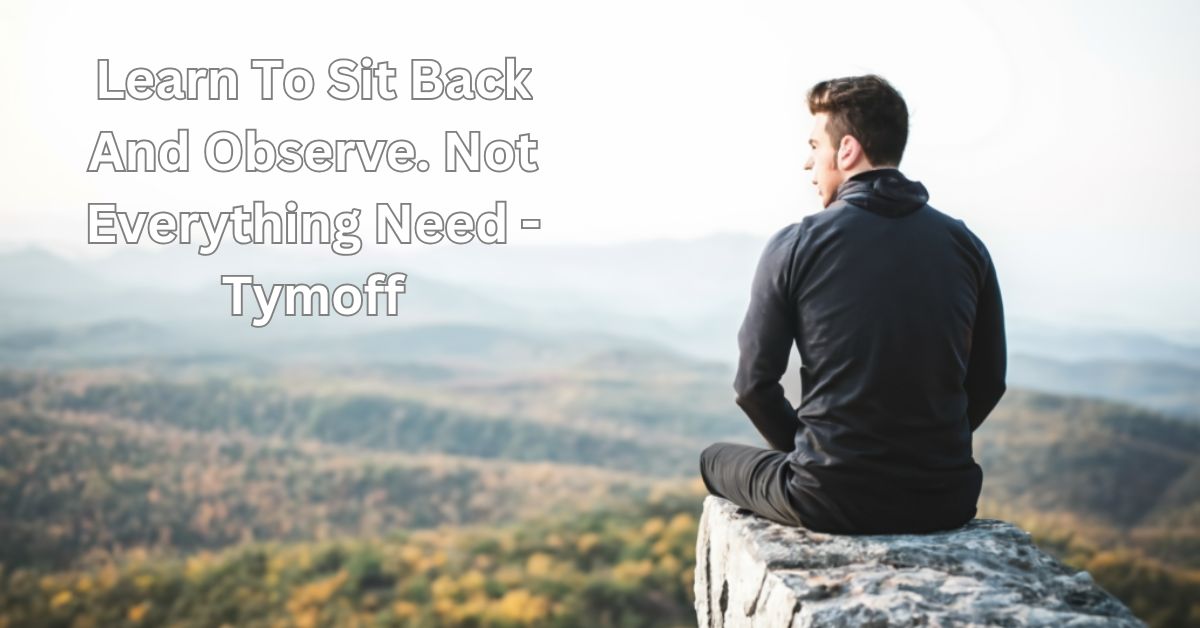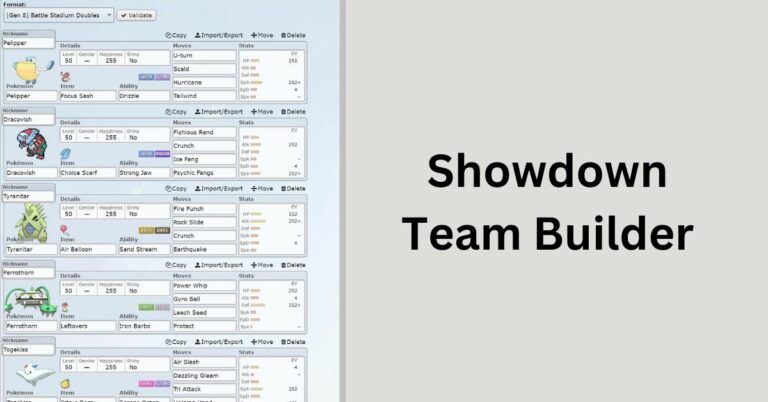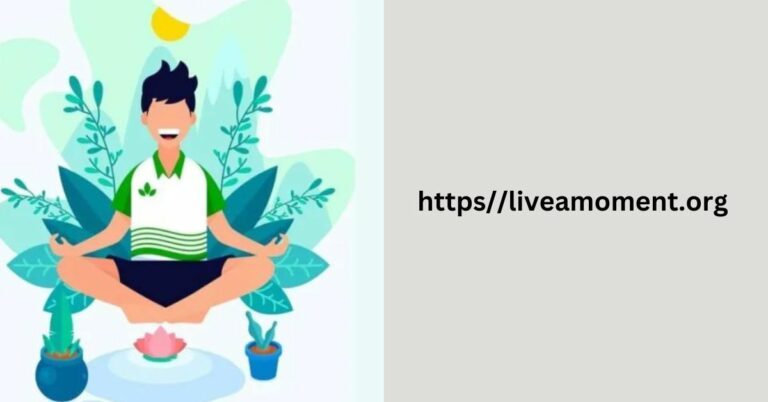Learn To Sit Back And Observe. Not Everything Need – Tymoff – A Powerful Secret To Success!
Sometimes, stepping back and simply observing can lead to better outcomes. I learned that not every situation requires immediate action or involvement. In my own experience, embracing this mindset brought clarity and more thoughtful decisions.
Learning to sit back and Learn To Sit Back And Observe. Not Everything Need – Tymoff can be a game-changer. Not every situation demands immediate action, and sometimes, taking a step back leads to clearer insights.
What is Observation? Everything You Need to Know!
Observation is when you look closely at something to understand it better. In other words, you pay attention to the details and note what is happening around you. Instead of reacting immediately, you have enough time to Learn To Sit Back And Observe. Not Everything Need – Tymoff and think over what you see.
When you Learn To Sit Back And Observe. Not Everything Need – Tymoff, you get information which may help you while making some better decisions. It might occur on people, circumstances, or even the surrounding. By keenly observing carefully, you understand things clearly and make more intelligent decisions.
The Importance of Observation: Ultimate Guide!
Observation is important because it helps you understand things more clearly. By paying attention to what’s happening around you, you can learn new information and make better decisions. When you Learn To Sit Back And Observe. Not Everything Need – Tymoff carefully, you can notice things others might miss and react in a smarter way. This can help in everyday life, at work, or in difficult situations.
Mindfulness and Awareness
Mindfulness and awareness mean paying full attention to what’s happening around you and inside your mind at the moment. It’s about being present and focused on the here and now, instead of worrying about the past or future. When you are mindful, you notice your thoughts, feelings, and surroundings without judgment, which helps you feel calm and clear.
The Value of Listening
Listening is important because it helps you understand others better. When you really listen, you pay attention to what people are saying and show that you care about their thoughts and feelings. This makes it easier to build trust and have stronger relationships. Listening also helps you learn new things and solve problems more effectively.
How can sitting back and observing improve decision-making?
Better Understanding of the Situation:
Taking a moment to Learn To Sit Back And Observe. Not Everything Need – Tymoff helps you fully understand what’s happening before reacting. By stepping back, you can see all sides of a situation and gather more information, leading to a clearer decision.
Reduces Impulsive Decisions:
If you reflect instead of acting blindly, then you are less likely to fall for the impulsive, questionable decisions that you might eventually regret. That will give you a moment to think thoroughly about your options.
Better View:
Seated, one finds a different perspective. Sometimes one may notice details or even solutions where one would have otherwise missed them when in the midst of things.
You are in control of your emotions.
Learn To Sit Back And Observe. Not Everything Need – Tymoff helps to keep your emotions on the right scale. You would not be apt to make rash decisions out of anxiety or excitement; instead, you would take calm and thought-out decisions.
Learn To Sit Back And Observe. Not Everything Need – Tymoff meaning:
“Learn to sit back and Learn To Sit Back And Observe. Not Everything Need – Tymoff, not everything needs – Tymoff” simply means that, for certain situations, you do not necessarily have to react or work upon every situation at once. It’s about being static, witnessing what is going on, and absorbing the whole situation before making judgments. Sometimes, silence is far more potent than common reactive actions.
This reminds us that patience and observation may lead to better choices. Stepping back will give an overview of the larger picture, avoiding unnecessary mistakes and letting things be handled with more clarity and wisdom.
What are the benefits of not rushing to take action? What You Need To Know!
Less Stress and Pressure
Rushing usually increases stress. Waiting for some time may enable you to remain as stable as possible and find ways to deal with things properly.
Better Relations
Sometimes waiting can prevent a lack of understanding of issues or misunderstandings of arguments between people. This gives them ample time to respond in a manner that would make people understand each other better.
Enhances Patience and Self-Restraint
The act of keeping back helps you to be patient. This patience enables you to deal with problems much better and have self-control.
Better Long Run Outcomes
Decisions with much thought given tend to be the best decisions in the long run. Sufficient time to think will make your actions assume the characteristics of your goal.
How can I develop the habit of sitting back and observing? A Beginner’s Guide!
Sit back and Learn To Sit Back And Observe. Not Everything Need – Tymoff, which leads you to the habit of patience before reacting or even speaking, all through the practice of patience and calmness in situations. Take time before you talk or act and try to Learn To Sit Back And Observe. Not Everything Need – Tymoff what’s going on around you. Try to listen more, notice small details like people’s expressions, actions. This makes you look at the bigger picture.
Secondly, starting small is essential in order to move from doing so in little situations, like communication or when solving a problem. Gradually, this becomes habitual-situations come naturally; therefore, the more one practices, the easier it becomes to stay thoughtful and make more responsible decisions.
How does observing help with clarity in difficult situations?
Allows Time to Understand the Situation
By pausing and observing, you can analyze what’s truly happening without rushing into action. This helps avoid misunderstandings and hasty decisions.
Reduces Emotional Reactions
Observing lets you step back from your emotions, making it easier to think calmly and logically. This is crucial when facing tough choices.
Reveals Important Details
Careful observation helps you notice things you might miss when acting too quickly. These small details can be key to solving the problem.
Improves Decision-Making
When you take the time to Learn To Sit Back And Observe. Not Everything Need – Tymoff, you gather more information, which leads to better and more informed decisions.
How has sitting back and observing helped others in real life? Ultimate Guide!
Being seated and just observing helped many handle matters better in real life. Sitting silent during arguments makes some people sit quieter and watch instead of jumping into things, giving them time to understand both sides before they respond in a calm manner, generally avoiding unnecessary conflict. By just observing, they get to know the feelings about others and find ways to solve problems peacefully.
Today, many people in the workplace have realized that by observing first, and then acting, they find smarter decisions made for their work. Taking some time to watch how others work or react instead of rushing into tasks or conversation leads one to finding better solutions and respect for a thoughtful approach. Sitting back and watching is often better at personal and professional life.
FAQs:
1. In what ways can sitting back and observing help relationships?
While sitting back and observing helps one understand one another by seeing their emotions and all actions, this can improve some communications and avoid unnecessary conflicts.
2. Does it really improve Learn To Sit Back And Observe. Not Everything Need – Tymoff?
Absolutely, since observation better helps a person see the full picture before acting on something. This encourages thoughtful actions that can lead to better solutions rather than hasty decisions that may sometimes create more problems.
3. How does observing help in stressful situations?
Observation helps you remain calm and assess the situation, ruling out impulsive nature. Thiswill automatically reduce your level of stress and improve your reaction .
4. What are some steps that can help in habituating observing?
Start by practicing mindfulness and keeping quiet during discussions. Listen carefully for what is required instead of reacting impulsively.
5. Does observing enhance personal growth?
Yes, observing teaches patience, awareness and understanding all with it that have to do with self-improvement and better decision-making.
Conclusion:
The more you sit back and watch, the clearer and patient you become in handling matters. You understand better so that you can think of how you should respond rather than acting from impulse. This can really help in the improvement of relationships, in making better decisions, and in growth in so many ways because it frees you from unnecessary stress brought about by mistakes. This habit can lead to a more composed life.




